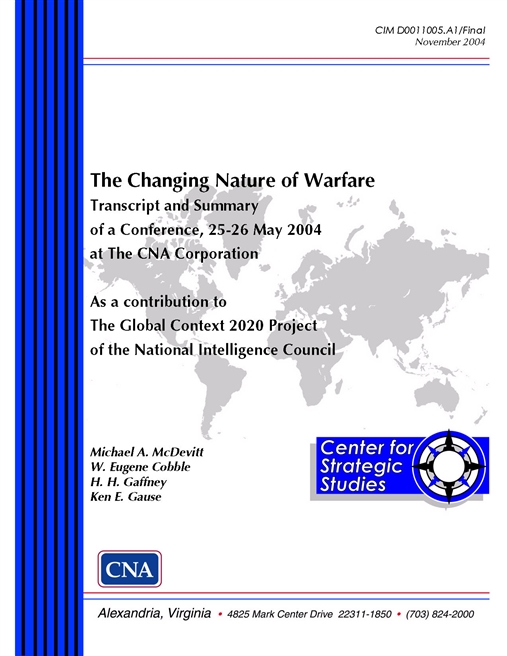On May 25-26, the CNA Corporation held a conference on the changing nature of warfare on behalf of the National Intelligence Council (NIC), as part of their Year 2020 project. Ambassador Robert Hutchings, Chairman of the NIC, opened the conference. He explained how the 2020 project is not meant to predict the future, but to provide a heuristic, that is, an instructive, view of how the world could unfold over the next two decades. This is best done through the creation of alternative futures. The alternatives the NIC has suggested include:
Pax Americana. This would be unilateral at the beginning, but how can the United States function in it over the long term? It will take lots of trade-offs and deals. The demands on the U.S. military would be substantial: the U.S. would be the regional sheriff.
Davos world. This is the most benign alternative future. It involves unfettered globalization. China and India would play by the rules. China would be the biggest country in sheer volume. The U.S. would prosper, but would be one of many. The unipolar moment would pass. The world would be benign as far as security goes, so there would not be too much conflict or military efforts by countries.
New world disorder. Conflicts would grow and spread. Clashes of civilizations could take place. The International institutions that have otherwise been trying to regulate globalization and world peace would fray, or collapse, or would be eroded in their effectiveness.
The conference attempted to address one aspect of this project, the changing nature of war, examining it from a variety of functional and regional angles. The objective of the conference was to explore the roots of potential conflicts; the characteristics of war that are likely to persist into the future; the emerging characteristics of war; and the impact of contemporary conflict on the United States, its allies, and potential enemies. In order to accomplish this, we set out a conference agenda with six panels:
- Prospects for conflicts between today and 2020.
- Persistent characteristics of war.
- Emerging characteristics of war.
- Impacts of contemporary conflict on friends and allies.
- The same for other countries, including China.
- What the U.S. has learned and how it thinks warfare will evolve. We also had a lunch speaker address Latin America.
We commissioned 21 papers on these subjects, lined up six distinguished moderators/discussants, and assembled five well-known experts on war and military affairs to comment on the overall conference discussions. Of the 21 authors, five were from other countries (two from the United Kingdom, two from Israel, and one from Australia). Over the course of two days, this distinguished group of scholars gathered at The CNA Corporation in Alexandria, Virginia, to present their papers and engage in discussions among themselves and with a remarkably well-qualified audience from academia, government, and the military.
Download reportDistribution Unlimited. Specific authority: N00014-00-D-0700. For copies of this document call: CNA Document Control and Distribution Section at 703-824-2123.
Details
- Pages: 104
- Document Number:
- Publication Date: 11/1/2004
